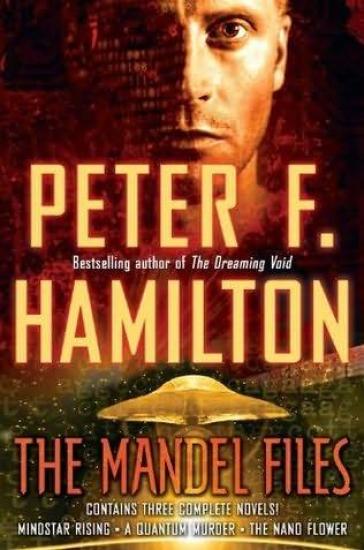
Series: Book 2 in the Greg Mandel series
Rating: Not rated
Tags: Science Fiction, Lang:en
Summary
Mindstar Rising (1993) is the first book
featuring the psychic detective Greg Mandel. It’s set
in England during the first half of the Twenty First century,
a time when the greenhouse effect has taken hold and produced
radical changes to the climate. England has altered beyond
recognition after enduring ten years of a hard-Left
government little short of outright dictatorship, food
shortages, a bankrupt economy, and industrial collapse. A
global energy crisis has left few cars running on a decaying
road network, jets have been replaced by more
environmentally-sound airships, and the information culture
bandwidth is approaching infinity. Companies own huge factory
ships that they anchor in international waters to churn out
pirated products which are smuggled ashore, untaxed and
unregulated. But now things are starting to recover. Water levels have
reached their peak, people in the old temperate zones are
learning to live with the heat. National economies are
recovering, and for the companies that can adapt and
restructure, the rewards are limitless. At the head of England’s industrial renaissance is
the giant Event Horizon company, owned by Philip Evans. A
maverick billionaire with only a short time left to live;
whose teenage granddaughter, Julia, is the sole heir to his
fortune. When sabotage is discovered in Event Horizon’s
orbital factories they call in Greg Mandel to expose the
organisation behind it. A veteran of the Army’s
Mindstar brigade, he’s been implanted with a
biotechnology gland that can induce psi faculties. As a
living lie detector, locating the disloyal employees should
be an easy task for him. However, the deeper he digs into the murky world of
corporate politics, the more complex and dangerous the case
becomes. Rogue financiers, old enemies, lethal hardware, and
treacherous loyalties ultimately combine to threaten the
world’s fragile new stability. * * * Set two years after the events of Mindstar Rising,
A Quantum Murder (1994) has the hallmarks of
classic whodunit fiction; starting one dark and stormy night
in an English country mansion where the old owner is brutally
murdered. The victim is professor Edward Kitchener, a noble
physics laureate. There can only be six suspects, the
students locked in the house with him. Naturally they protest
their innocence. Julia Evans calls in Greg Mandel to solve the case.
Kitchener was working on some radical technology for Event
Horizon, so she needs to know fast who killed him, and
why. Appointed over the heads of resentful local police, Greg
has to sift through conflicting strands of evidence to find
the killer. His psi ability shows that none of the suspects
could have killed Kitchener. While a new type of psi that is
Kitchener’s legacy reveals exactly who did. The paradox
leads Greg to a confrontation with an old adversary from a
past with according to Kitchener’s theories might never
exist. * * *
The Nano Flower (1995) takes place a further
fifteen years on. With the world now firmly out of the
recession that plagued the warming years, life has settled
down to a quieter, more prosperous pace. Clean energy sources
have reinvigorated the global economy. Asteroids shunted into
Earth orbit are mined for their mineral resources. Democracy
has returned to most countries. And strong Strategic Defence
alliances safeguard nations from the possibility of sneak
attack. Into this placid equation comes a strange flower.
Delivered mysteriously to Julia Evans, it has alien genes
millions of years in advance of terrestrial DNA. At the same
time, hints of a fabulous new technology begin to spread
through the corporate security agencies. Its origin: unknown.
Whoever is the first to acquire it will have the power to
dominate the planet, both in industrial and military
terms. Believing the two to be linked, Julia calls Greg out of
retirement to track down whoever sent her the flower.
It’s been a long time since he did this kind of work,
and the new generation of security agents and mercenaries no
longer play by the old rules. His search becomes a desperate
race against a vicious killer, backed by an arms dealer every
bit as rich and as powerful as Julia. Zig-zagging across the globe in hypersonic aircraft from
decadent Monaco to the simple farming colonies set up in the
wake of Greenland’s melting glaciers, Greg encounters a
jaded old merchant and his odd son, a courtesan who’s
playing her own duplicitous game, and a crime syndicate that
have extended their reach far beyond Earth. All of them draw
him inexorably to a meeting with an entity that will decide
the fate of two species.